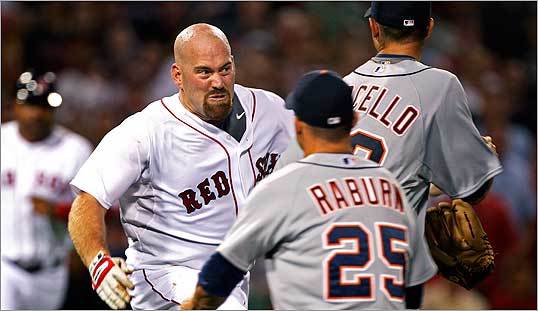For the Red Sox, last night was atrocious. Their bullpen collapsed under pressure. Brock Holt was forced into a situation that he had no idea what to do with and it was one of those games where the manager single-handedly lost the game for the Red Sox. Let’s break it down here.
So Brock Holt was playing first base because Mitch Moreland was scratched to give him a day of rest following a collision with Brett Gardner. At a position that he hasn’t played since 2015 and had never played until then, he does this:
Hammy, anyone? #RallyTogether pic.twitter.com/B7AxVkM9zG— Cleveland Indians (@Indians) August 22, 2017
<script async src="//platform.twitter.com/widgets.js" charset="utf-8"></script>
My first question is why play Holt at first base to start with? Holt had a total of 11 games played at first base in his life until this point. He hadn’t played since 2015, minus one inning previously this season. In 2015, he only played because David Ortiz refused to play first. Holt was having a career year too, so they gave him the time everyday in the lineup.
Putting Holt at first was the easiest switch given Moreland’s situation but it wasn’t the smartest switch. The best scenario would have been putting Hanley Ramirez at first base, Brock Holt at second and Eduardo Nunez at DH. You get all three bats into the lineup, with the best defensive player on your roster at the corresponding position. Maybe if Hanley actually listened and dies what Farrell says...but anyway, mistake number one for Farrell.
Next blunder. The bullpen.
No one was in the bullpen pitched effectively, so you can’t blame Farrell entirely for the bullpen. But where Farrell earns the blame is in which situation he brought in each pitcher. The eighth inning comes up. Farrell elects to bring in Matt Barnes, the team’s worst pitcher on the road. In this situation, one would assume the best available pitcher was Addison Reed. However, Reed was not available according to Farrell. He had pitched three consecutive days and needed a day of rest.
Casual fans and writers would both agree that the next best option in this situation was Brandon Workman. Workman has been gaining the trust of Farrell and for good reason. In the month of August, Workman had pitched 8.1 innings of no run baseball. He has a 1.40 ERA in 25.1 innings and he has been throwing strikes. In the month of August, Workman has thrown 62% of pitches for strikes. But instead, Farrell brings in Barnes.
Here, Farrell is indicating that the best pitcher for this situation was Barnes. Wrong. The statistics prove otherwise. You can’t use Barnes on the road. And then Farrell brings in Heath Hembree. Heath Hembree. The pitcher that has allowed the most inherited runs on the team. Maybe you bring in Hembree first if you have to use him. Anything but this situation.
In one of the more important games of the season, Farrell found a way to blow the game for the Red Sox. When you’re two games ahead of the Indians in the standings and when home field advantage proved the difference in last year’s ALDS, games like this prove the difference down the stretch. A game that was easily winnable and Farrell finds a way to lose the game for the Boston Red Sox.


